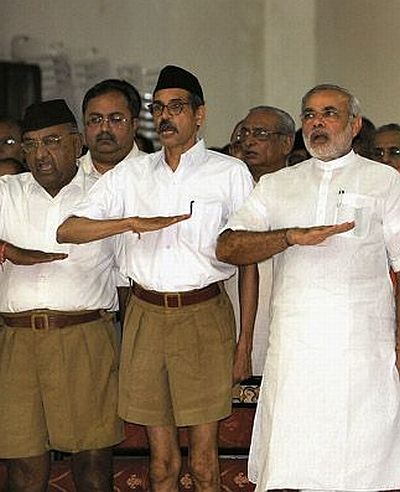 In mid-June, when the Narendra Modi government was barely a fortnight into the job, Smriti Irani, the human resources development minister, called a meeting of the country’s top academicians. The collective wisdom in the room was awe-inspiring and the mood was electric. Before the meeting could start, a senior bureaucrat informed all those in the room that there was also an ‘observer’ in their midst, an ‘expert’ who would give a feedback of the discussions to senior people in the government and the Sangh Parivar -- the Rashtriya Swayamsevak Sangh and its three dozen affiliates.
In mid-June, when the Narendra Modi government was barely a fortnight into the job, Smriti Irani, the human resources development minister, called a meeting of the country’s top academicians. The collective wisdom in the room was awe-inspiring and the mood was electric. Before the meeting could start, a senior bureaucrat informed all those in the room that there was also an ‘observer’ in their midst, an ‘expert’ who would give a feedback of the discussions to senior people in the government and the Sangh Parivar -- the Rashtriya Swayamsevak Sangh and its three dozen affiliates.
Last week, this perception got reinforced when the Swadeshi Jagaran Manch and Bharatiya Kisan Sangh claimed to have persuaded the Minister of Environment, Forests and Climate Change Prakash Javadekar to put on hold field trials of 13 genetically modified crops, including aubergine and rice -- this in spite of the Bharatiya Janata Party’s pre-poll promise that its government would take a view on the issue after conducting field trials. RSS has deputed Ram Madhav, its spokesperson, and Shiv Prakash, a senior worker in Madhya Pradesh, to BJP for better coordination. Madhav, who is likely to become BJP’s organising secretary, has attended all meetings that the party’s president, Amit Shah, has had with the leadership of the four states slated to go to polls later this year.
Educationist Dina Nath Batra, who has been associated with Vidya Bharati, another RSS affiliate, is likely to recommend changes in school textbooks to suitably “Indianise” them. Yellapragada Sudarshan Rao, an unabashed admirer of the India of old, has been appointed chairman of the Indian Council of Historical Research. More such appointments could happen in the next few months.
Incidents like these are being put forth as evidence of the Sangh Parivar’s say in the decisions of the Narendra Modi government. The Opposition, particularly the Congress and the Left parties, have damned the Modi government for being remote-controlled by the RSS headquarters in Nagpur. On July 3, Communist Party of India-Marxist General Secretary Prakash Karat told a public meeting in Kurnool in Andhra Pradesh that “RSS is running the Modi government.”
Shrikant Sharma, BJP media cell chief, disagrees that the Modi government is being steered by the Sangh Parivar. While he says he is proud to be a part of a nationalistic organisation like RSS, he argues that it “is the prime minister who runs the government and the president of the party runs BJP, and RSS’s work is handled by its leadership.” The government, he says, welcomes all suggestions “that are in the national interest from across the nation and from all ideological streams, including RSS, and is committed to implement these”.
Pawan Kumar, organising secretary of the Bharatiya Mazdoor Sangh, says if BJP was pliant, the Vasundhara Raje-government in Rajasthan wouldn’t have pushed through labour reforms despite protests from his organisation.
One Sangh Parivar leader says all RSS wants is that the government should implement the BJP manifesto, nothing more. “Most ministers in the government are also swayamsevaks (RSS volunteers) and understand the RSS’s mind,” he says. Did the observer at the meeting called by Irani reflect this position? Rakesh Sinha, an academician associated with RSS who heads India Policy Foundation, a think tank, disputes that there was any observer at the meeting. “But even if there was, what is wrong?” he asks. “Is anything wrong if the minister asks somebody to be a silent observer in the meetings?” RSS and BJP, according to him, have strong “moral, ethical and ideological bonds”. He says the media and opposition parties are out to turn RSS into an ogre, a strategy that will fetch diminishing returns.
Image: Narendra Modi with RSS activists.













 © 2025
© 2025